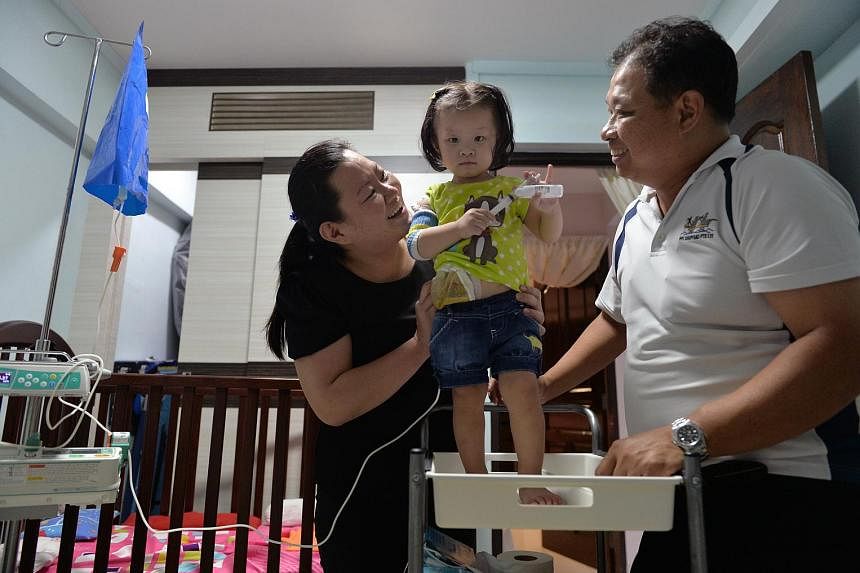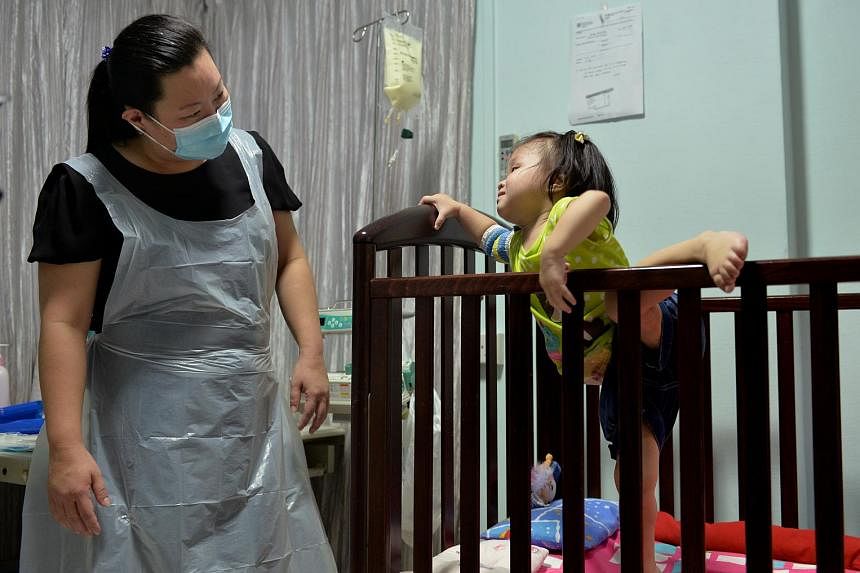Ng Hwee Suan dives straight for my mobile phone, mistaking it for her father's, and grimaces when it is moved out of her reach on the table.
Rambunctious, with a mischievous glint in her eyes, the 19-month-old is 87cm tall, weighs 11.5kg and is sturdily built.
But looks deceive. Hwee Suan's health has not only given her parents much grief and many sleepless nights but also almost completely depleted their savings. Her medical needs cost them $8,000 a month.
She was born with a form of dysmotility, a condition in which the muscles of the gastrointestinal tract - from oesophagus to stomach and intestines - do not work normally. As a result, she cannot eat or pass motion properly.
What looks like a sporty, knitted armband on her right arm is actually a baby's knee guard which hides a peripherally inserted central catheter (PICC). This is a long thin, hollow tube inserted into a large vein in the arm and threaded into the main vein near the heart.
PICCs administer chemotherapy regimens for cancer patients or antibiotic therapy for those suffering from chronic conditions. In Hwee Suan's case, it delivers total parental nutrition (TPN) - a potent combination of carbohydrates, proteins, electrolytes and other nutrients - into her bloodstream because she cannot eat normally.
Under her dress is a stoma bag. Doctors discovered that her intestines were blocked at birth, and surgically created an opening in her abdomen so that urine and stools can be collected in a bag. Every day, she has to be hooked up to her PICC line for at least 12 hours, and her stoma bag has to be drained or changed a couple of times.
-
SUPPORT BY
-

-
Look out for Wong Kim Hoh's upcoming book commissioned by Standard Chartered Bank.
It Changed My Life is a compilation of inspirational stories from this series, and is part of the bank's initiative to celebrate Singapore's Golden Jubilee.
"You can't tell that she is not well and is a patient, right?" says Madam Ivy Yeo, 39, looking fondly at her daughter. A risk manager turned property agent, she is married to oil rig project manager Edwin Ng, 41. The couple have two other daughters, aged three and five.
Hwee Suan's medical problems hit them like a bolt from the blue. The baby weighed a hefty 3.75kg at birth. There was nothing to suggest anything was wrong except that she did not seem to feed well.
The next day, just as Madam Yeo was getting ready to leave the hospital, a doctor came with disturbing news. "He said Suan had not poo-ed for more than 24 hours. Instead she kept vomiting," she recalls. An X-ray revealed her blocked intestine. "It was very dilated and choked up, and she needed surgery so that it would not burst."
The infant was just three days old when she underwent surgery at KK Women's and Children's Hospital. It took nearly seven hours and she was in the Intensive Care Unit for two weeks. Doctors initially suspected she might have Hirschsprung's Disease - a congenital condition which affects the colon.
"The doctors told me her stoma could be closed once she started feeding well," says Madam Yeo.
That has not happened. After the operation, the baby threw up everything she was fed. She had to be kept in hospital, where doctors put her through a battery of tests, which ruled out Hirschsprung's. But even today, no doctor has been able to diagnose the cause of her intestinal failure. Not knowing is the couple's biggest grief.
"I want a cure, I really want her to be normal. You may tell me she looks normal but she is not," says Madam Yeo, who has read up voraciously on intestinal failure, compiled detailed notes of her daughter's condition and treatments and written to scores of doctors all over the world for second opinions. "Many replied," she says, showing me a list of doctors from Australia to Japan.
One, Professor John Hutson of the Royal Children's Hospital in Melbourne, even dropped in to see Hwee Suan when he was in Singapore for a conference.
But no one has been able to offer solutions to improve her condition.
Since she was three days old, Hwee Suan has been on TPN. The treatment requires special equipment and stringent medical procedures. For the first six months, she required one pack of TPN daily. Each pack cost $500 and she had to be hooked up to it 22 hours a day before it was gradually reduced to 12 hours now. The Ngs are working with doctors to bring down her dependency on TPN. Besides the high costs, there are long-term side effects, including liver failure.
Hwee Suan now has one pack a week. On other days, she is hooked up to a mixture of glucose water, salts and electrolytes to sustain her. Her parents are working with doctors to increase her tolerance for food such as porridge and bread. It is a frustrating process. "It takes one hour to give her two tablespoons of porridge," says her father.
KK Hospital was Hwee Suan's home for the first eight months of her life. It was an extremely trying period for the Ngs, who found their lives irrevocably changed.
When he was not at work, Mr Ng says, he was at the hospital. "My two elder kids were very young then and we neglected them. They would be asleep by the time I got back from the hospital. I felt really sad and found it emotionally hard."
Fortunately, family members - including his mother and his sister- in-law - helped to mind the older children. As her job as a part-time property agent was more flexible, Madam Yeo spent whatever time she could at the hospital. There were then a few children, aged from a few months to eight years, all with some form of dysmotility and needing TPN. Except for weekend home visits, at least three had spent their entire lives there. That was something she and her husband did not want for Hwee Suan.
Mr Ng says: "We wanted to bring her home so we could bond as a family." It took the couple four months before the hospital came round, because administering TPN is complicated. Besides special equipment, a sterile environment is crucial.
"If anything goes wrong, Suan's condition deteriorates very quickly," Madam Yeo says. "She is very susceptible to infections and because the PICC line goes straight to the heart, it could be dangerous."
She and her Filipino helper Lovelyn Ballogan underwent intensive training. They cleared out a room for Hwee Suan; it is where she gets her TPN and where all her medical essentials are stocked. "The home care nurses came to our flat four or five times to make sure everything was in order," says Madam Yeo, who keeps meticulous records of what her child eats and excretes.
At first, Hwee Suan was home one day, back in hospital the next. Slowly, the periods at home lengthened. She now spends just one day a week in hospital. Mr Ng says: "We were very paranoid in the beginning and didn't go out on family outings. But recently, we decided this was not the way to live."
His wife adds: "To minimise the risk of infection, we take her to places where there are not so many people, like the beach or to a fish farm my family owns in Pasir Ris."
There have been several scares. The toddler has tried to rip off her PICC line a few times; there have been minor problems with the equipment. The Ngs had already spent more than $90,000 on medical bills before she came home.
The couple, who are living off their savings, are worried about the future. Their Medisave accounts are almost completely depleted. They are unable to claim many of Hwee Suan's expenses from MediShield because the scheme allows claims only if the patient stays in the hospital for at least eight hours. They also cannot claim for many items Hwee Suan needs, including stoma bags and the TPN tubings.
They have raised these issues with the health authorities.
"I don't know what will happen, and I wonder how she will cope. But there's not much I can control. I just focus on managing the TPN and fending off infections," says Madam Yeo. "My husband and I are really thankful to the nurses and doctors at KK. With their help, Suan has come a long way.
"I have heard of cases of children who learn to hook themselves up. Some of them are in their 20s and need TPN only when the occasion calls for it."
There have been times when she has been overwhelmed, but she says Hwee Suan gives them a lot of joy. "It's bittersweet so you don't think further. We just have to live one day at a time."
With a sigh, she says: "I can adjust my lifestyle to suit her but I really want her to be cured. I don't want to be told there's no cure.







